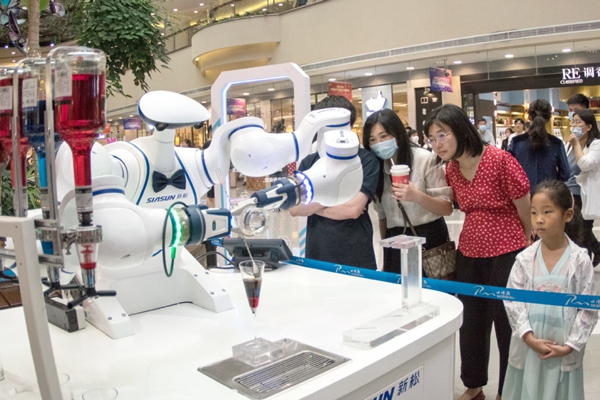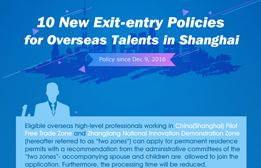5th WAIC to spotlight metaverse

Visitors observe a robot making a cocktail during the WAIC 2021 in Shanghai. [Photo provided to China Daily]
The fifth World Artificial Intelligence Conference (WAIC), themed "Intelligent Connectivity, Infinite Multiverse", will take place in Shanghai from Sept 1 to 3 with a focus on the metaverse.
The 2022 WAIC will explore the development of AI and the metaverse, connect the latest viewpoints and achievements in AI worldwide, and showcase Shanghai's outlook on AI.
Shanghai has released a number of metaverse-related policies and action plans in the first half of the year, and at the event, the city will demonstrate its exploration and capabilities in the field of the metaverse to the world.
The metaverse exhibition, which is based on artificially intelligent, and computer-generated virtual reality, will be one of the highlights of the 2022 WAIC to showcase the latest advances in the AI industry as Shanghai moves to build a world-class AI development cluster.
The 2022 WAIC has attracted more than 200 exhibitors to showcase their products in the 15,000-square-meter exhibition area. Over 30 percent of these companies are first-time exhibitors. This will also be the debut show for some of the latest products.
More than 300 heavyweight guests from the AI industry, science, and financial circles from home and abroad will attend the event and nearly 100 forums will be held on topics related to global AI technology innovation, industrial application, rule of law ethics and ecological construction.
Using the latest technology to hold an AI event has been the main goal of the WAIC organizers. The 2022 WAIC created the online Metaverse 3.0 version to improve online viewers' experiences by using the "Planet Metaverse" as the inspiration for the overall design. The new version features a brand-new conference hall with a high-definition immersive experience.
The Metaverse Core Exhibition, which will be held offline, will combine the achievements of the fifth anniversary of the WAIC to showcase Shanghai's AI and metaverse development using virtual experience and reality displays.
Shanghai has released an action plan (2022-2025) for cultivating the metaverse sector, which clearly states that the metaverse industry scale is projected to reach 350 billion yuan ($51 billion) by 2025.
Focusing on digital transformation, Shanghai has promised to nurture and incorporate the metaverse into the transformation of life, the economy and digital space. The city plans to build 10 globally competitive enterprises and 100 specialized companies, launch more than 100 leading products and services that lead the industry, and release major application scenarios of the AI metaverse.
Since 2018, the WAIC has been successfully held four consecutive times. After four years of growth and development, the WAIC has become an application display stand, an industry accelerator, and a governance forum with increasing international influence.
In the past four years, the WAIC has witnessed more than 200 major industrial projects come to fruition, with a combined investment of more than 60 billion yuan, and more than 200 innovative products made their first appearance there. By organizing more than 300 activities and issuing a number of policy discussions, publications, reports and initiatives, the WAIC has become an important platform for the city's AI development.
In 2021, the number of online viewers of the WAIC reached 383 million. At the closing ceremony of the 2021 WAIC, 26 major projects in the AI industry were signed, with a total investment of over 10 billion yuan.
The highest award of the WAIC - the SAIL (Superior AI Leader) Award - attracted 800 projects this year. Many of them are metaverse, smart chip and large model projects. The SAIL Award is selected every year. It aims to discover reputable projects with high recognition in the field of AI on a global scale.
This year's applicants include Huawei, Baidu, Amazon and other domestic and foreign leading companies, as well as scientific research institutions such as MIT, Stanford University, and the Chinese Academy of Sciences.

 Print
Print Mail
Mail




